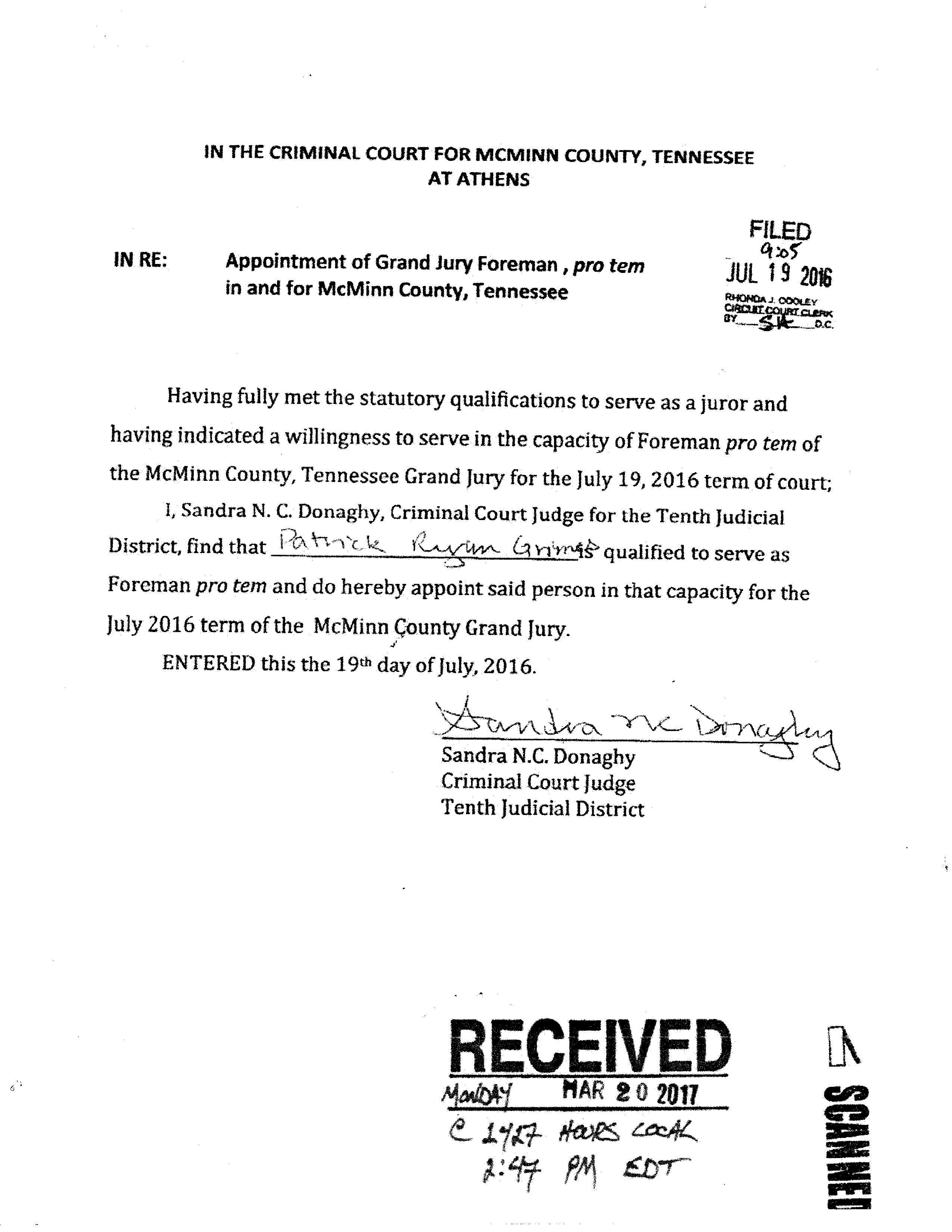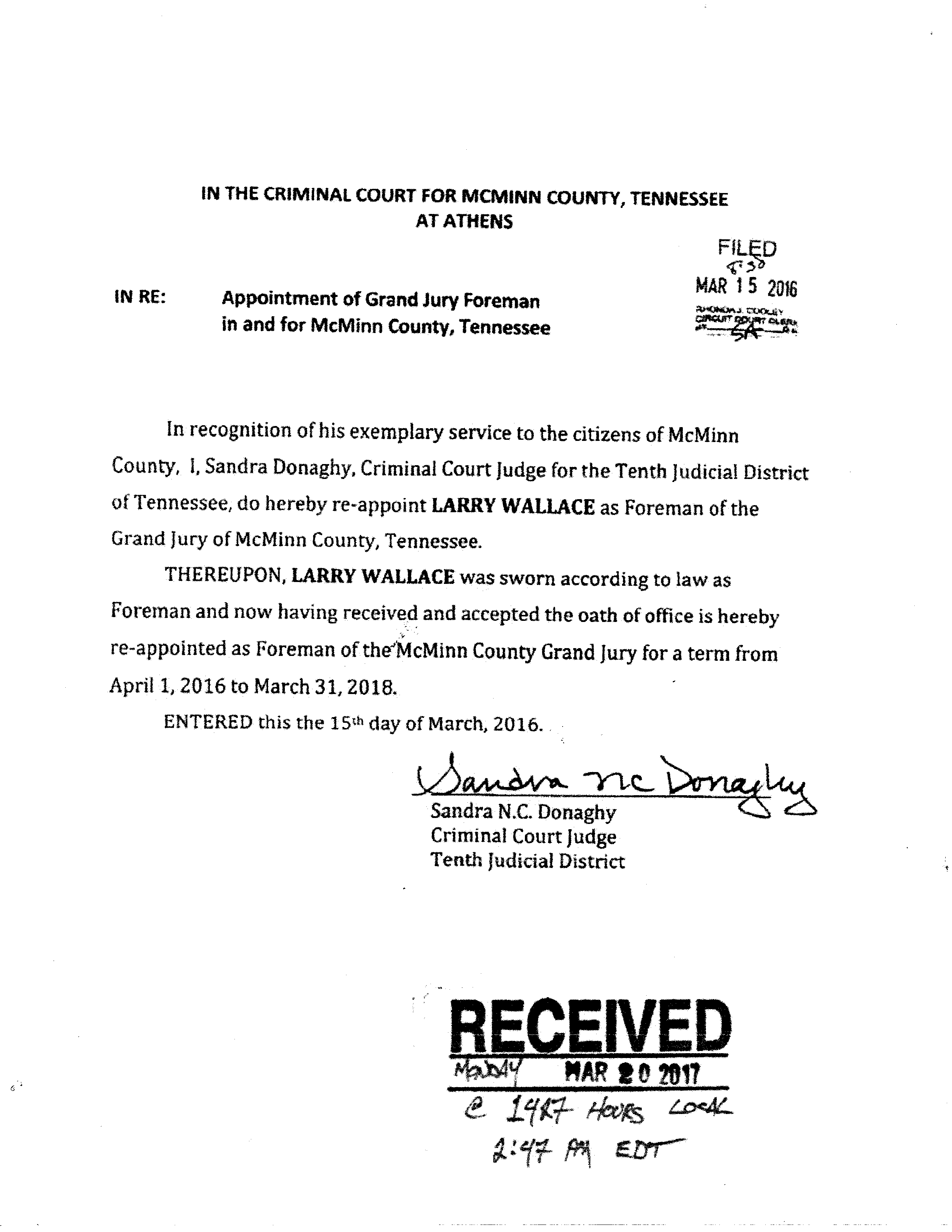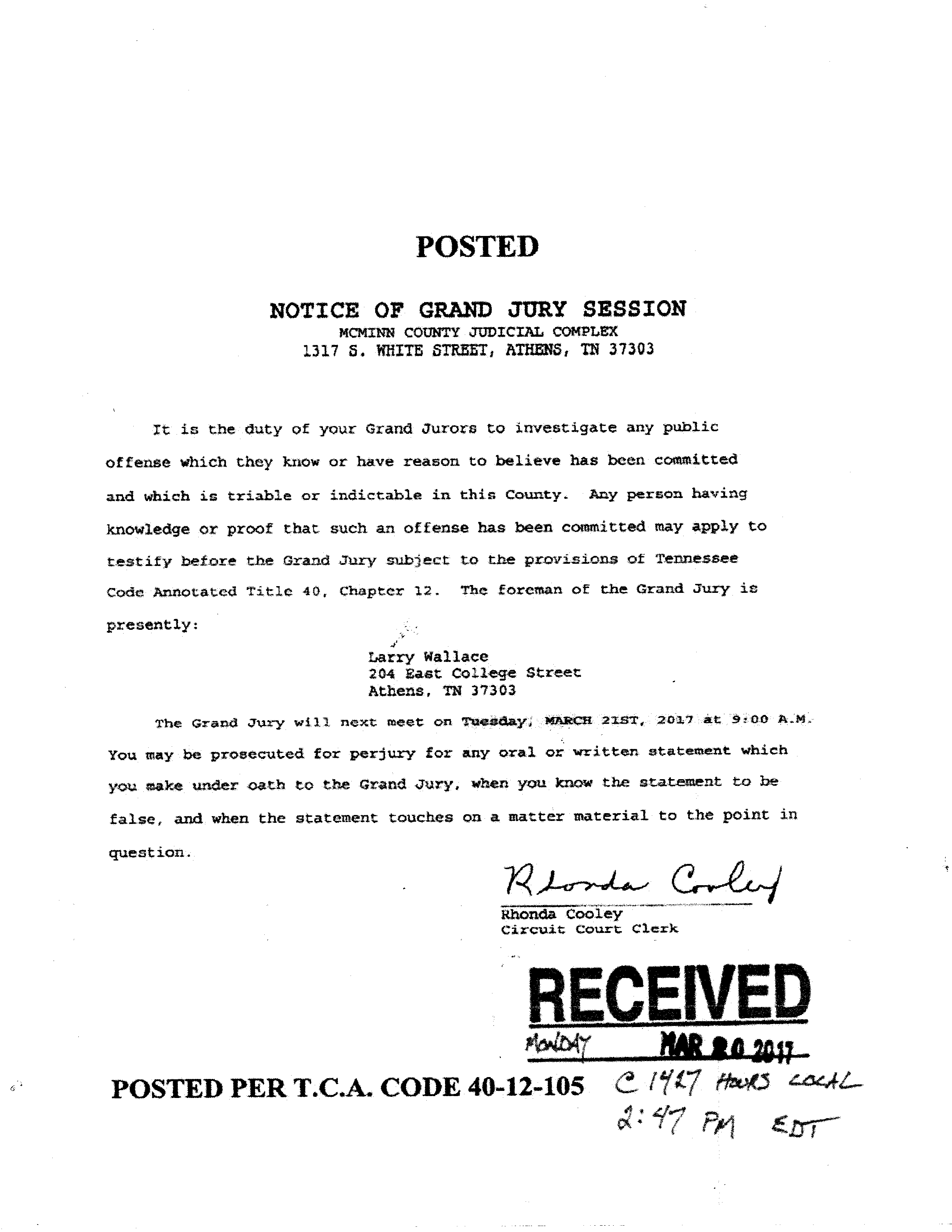HAND-SELECTION OF GRAND JURY FOREMAN CONTINUES UNABATED
by Sharon Rondeau
 (Mar. 21, 2017) — Through an Open Records request, on Monday Walter Francis Fitzpatrick, III received a copy of the McMinn County, TN public grand jury notice showing that the grand jury would convene at 9:00 a.m. on Tuesday.
(Mar. 21, 2017) — Through an Open Records request, on Monday Walter Francis Fitzpatrick, III received a copy of the McMinn County, TN public grand jury notice showing that the grand jury would convene at 9:00 a.m. on Tuesday.
He additionally received copies of grand jury foreman appointing orders signed by Tenth Judicial District Judge Sandra Donaghy, who replaced Judge Amy Armstrong Reedy as a result of the August 7, 2014 general election.
The Fifth Amendment to the U.S. Constitution reads:
No person shall be held to answer for a capital, or otherwise infamous crime, unless on a presentment or indictment of a grand jury, except in cases arising in the land or naval forces, or in the militia, when in actual service in time of war or public danger; nor shall any person be subject for the same offense to be twice put in jeopardy of life or limb; nor shall be compelled in any criminal case to be a witness against himself, nor be deprived of life, liberty, or property, without due process of law; nor shall private property be taken for public use, without just compensation.
The hand-selection by judges of the foreman has created a situation whereby the foreman serves as a personal assistant to the judge rather than an impartial citizen selected by “random, automated means” as mandated by law.
State statute also prohibits any juror to serve again until 24 months have elapsed since his last date of service.
Through extensive research, including when he was in state prison between August 2014 and October 2016, Fitzpatrick has found that there was once a time when the foreman of a Tennessee county grand jury was not hand-picked by a judge from outside of the jury pool.
An 1883 Tennessee Supreme Court case demonstrated that fact. However, by 1919, the Tennessee legislature had gone so far as to legislate the illegal hand-selection of the foreman from outside of the impaneled grand jurors “at the judge’s discretion.”
Although the unconstitutional law was repealed in 1979, the practice has continued and is justified by “jurists” throughout the state of Tennessee with the apparent intent to maintain their power.
As The Post & Email has reported over more than seven years, a judicially-appointed foreman injects the government’s influence into the grand jury’s proceedings. Moreover, a Davidson County grand jury foreman chosen by a judge and not vetted for conflict of interest and other disqualifying factors spurred the need for prosecutors to review hundreds of cases in 2013 when it was found that he was a convicted felon.
While many defendants have attempted to challenge the legitimacy of such “grand juries,” the judges, prosecutors, and defense attorneys protect the system built over many decades which has given the judicial branch unchecked power.
Members of the legislature have shown little interest in the tyranny which has resulted from an out-of-control judiciary evidenced in part by the hand-picking of grand jury foremen from anywhere they wish.

Although state law allows anyone to submit a request to appear before the grand jury, Fitzpatrick has not been permitted to do so. His convictions in June 2014 for “aggravated perjury” and “extortion” arose from his multiple attempts to testify to the grand jury about local corruption.
The Tennessee Rules of Criminal Procedure by random means and passing through the customary screening process, there is no way to know if the foreman meets that requirement.
Each indictment issued by an illegally-operating grand jury is therefore questionable, as is any “No True Bill” resulting from the undue influence of the grand jury foreman, who is actually an employee of the judge.
Over the same period of time, Fitzpatrick has attempted to raise awareness within the community of the illegally-functioning grand juries to no avail.
Of the dozens of Tennesseans with whom this publication has spoken since Fitzpatrick brought the issue to our attention in late 2009, many have mentioned what they say was a lack of evidence in their own conviction or that of a loved one. The review of evidence by the grand jury is its function in determining whether or not a citizen of the community should be prosecuted for crime.
Grand jury members also have the ability and authority to investigate matters on their own. However, as grand juries have increasingly come under the control of judges and prosecutors through the 20th and now 21st centuries, their role in rooting out public corruption has diminished significantly.
Before serving as judge, Donaghy was an assistant prosecutor in both the Seventh and Tenth Judicial Districts. Her biography on her campaign website, which is still active, states:
Qualifications are an extremely important aspect for one desiring to be criminal court judge.
“Whether you are a victim of crime or the defendant, you want your judge to know and understand the law.” [sic] An analogy might be “if you needed heart surgery, would you want the best cardiologist available or would you want a pediatrician to do the surgery.” Since I have dedicated the last 22 years of my practice to criminal law, I have specialized in this area. I have studied the law and strive to keep current in the issues that face criminal courts. On a daily basis, I apply the law to the cases brought to me by law enforcement. Of the candidates running for criminal court judge, my training and experience puts my qualifications head and shoulders above the rest.
The appointing orders show that contrary to her campaign pledge, Donaghy has continued the practice of her predecessor of handpicking the foreman of the grand jury.
Fitzpatrick, a retired Navy executive officer, has described the hand-picked foreman as a “commanding officer.”
In May 2014, in response to our questions concerning the hand-selection of the grand jury foreman, Donaghy wrote, “…if elected I intend to follow the law and operate the court in a professional manner. I shall be respectful to all who are present before the court.”
Donaghy’s reappointment of Athens Federal Community Bank (AFCB) and parent company Bancshares Chairman Larry Wallace not only renews Reedy’s last appointee, but also continues the presence of a career law enforcement officer as head of the grand jury.
Previous to Wallace, AFCB President & CEO Jeffrey L. Cunningham served as McMinn County grand jury foreman for multiple two-year terms. At the time, Cunningham was earning more than $600,000 annually from his position at the bank.
The question as to why a highly-compensated bank executive would wish, or have the ability, to preside over a county grand jury for $11.00 a day remains unanswered. Some have speculated that there exists a nefarious connection between the federally-chartered bank and the McMinn County judiciary.
There is nothing in Tennessee law which allows for the recognition of a grand jury foreman for “exemplary service,” including reappointment.
In 2016 there were two temporary McMinn County grand jury foremen. It is unknown as to whether or not they were chosen from within the group of empaneled grand jurors.

As Fitzpatrick noted in an interview on Sunday, the issue of judicial corruption and “overreach” has become a national concern on the part of many after a federal judge, three-judge appellate panel, and second federal judge imposed respective stays on presidential executive orders, drawn from existing federal immigration law, aimed at prohibiting the entry of citizens from countries identified as high in terrorist activity.





Just in case people don’t understand how we have such corruption in DC needs to do some research in their own local county which is the training ground for corruption at higher levels.